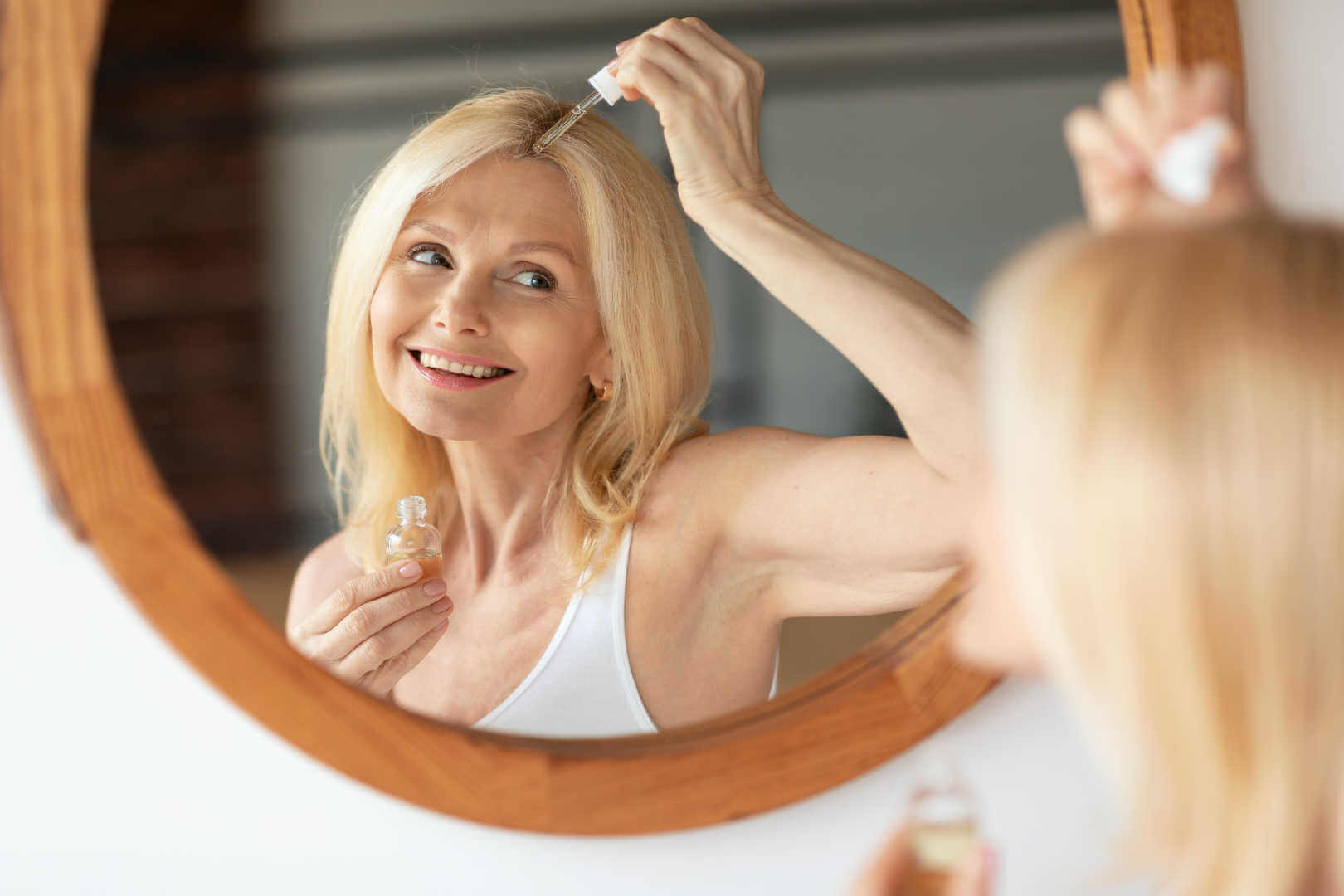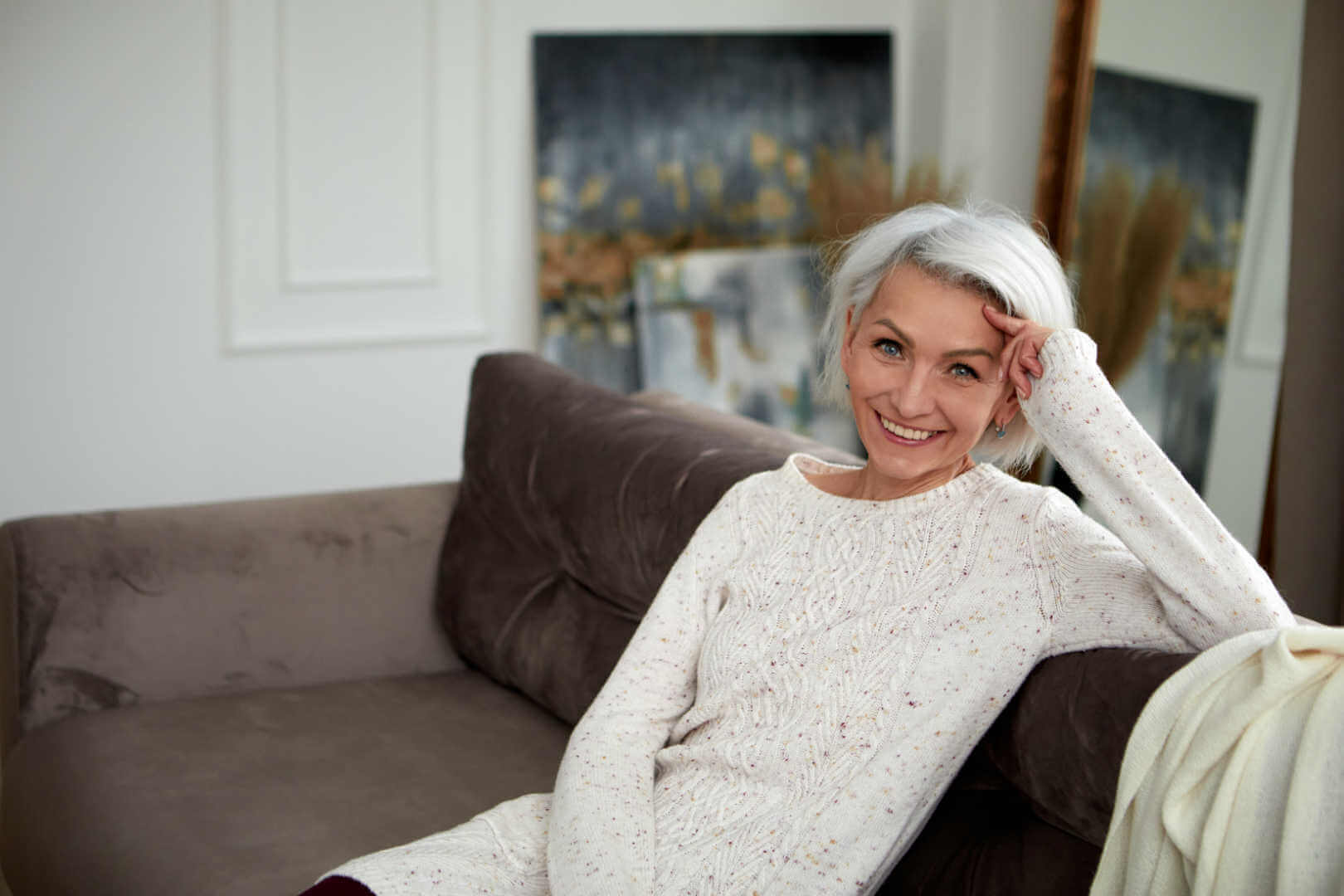Understanding Menopausal Hair Texture Changes
Before we delve into strategies, it’s essential to understand why menopause can alter your hair’s texture.
1. Hormonal Fluctuations
Menopause involves a significant decline in estrogen and progesterone, two hormones that play a crucial role in hair health. These hormonal changes can lead to various texture-related issues:
- Dryness: Reduced estrogen levels can result in decreased sebum production, making your hair dry and more prone to breakage.
- Thinning: Hormonal fluctuations can disrupt the hair growth cycle, leading to thinner hair.
- Changes in Curl Pattern: Some women notice alterations in their hair’s curl pattern during menopause, which can range from increased curliness to a loosening of natural curls.
2. Age-Related Factors
Apart from hormonal changes, aging itself can impact hair texture. As we age, our hair naturally undergoes changes:
- Fine Hair: Hair strands often become finer with age, leading to a change in overall texture.
- Reduced Pigment: Graying is a common part of aging and can also influence how your hair looks and feels.
Strategies for Managing Menopausal Hair Texture Changes
Managing and adapting to changes in hair texture during menopause involves a combination of lifestyle adjustments, proper hair care, and self-care practices. Here are some strategies to help you maintain and enhance your hair:
1. Hydrating Hair Care
Given the dryness that can accompany menopause, hydrating hair care is essential. Consider these steps:
- Sulfate-Free Shampoo: Use sulfate-free shampoos and conditioners to avoid stripping your hair of natural oils.
- Deep Conditioning: Incorporate deep conditioning treatments into your routine to restore moisture.
- Leave-In Conditioners: Leave-in conditioners can help keep your hair hydrated throughout the day.
2. Balanced Diet
A well-rounded diet can provide essential nutrients to support healthy hair texture. Include foods rich in:
- Protein: Protein is crucial for maintaining hair structure and strength.
- Omega-3 Fatty Acids: These promote scalp health and overall hair quality.
- Biotin: A B-vitamin known for improving hair thickness and strength.
3. Gentle Styling
Avoid harsh styling practices that can damage your hair. Opt for gentle hairstyles, and minimize the use of heat styling tools that can cause dryness and breakage.
4. Scalp Health
A healthy scalp is essential for healthy hair. Keep your scalp clean and consider scalp massages to improve circulation.
5. Haircuts and Styles
Update your haircut or style to adapt to changes in hair texture. Consult with a hairstylist who can recommend a cut that complements your hair’s new characteristics.
6. Stress Management
Stress can exacerbate hair problems. Practice stress-reduction techniques like meditation, yoga, or deep breathing exercises to promote overall well-being and hair health.
7. Professional Advice
Consult with a healthcare provider or dermatologist for personalized advice on managing hair texture changes during menopause. They can also help determine if hormone replacement therapy (HRT) or other medical interventions are suitable for you.
8. Embrace the Change
Finally, consider embracing the changes in your hair texture as a part of your journey. Menopause is a transformative phase, and your hair can reflect that transformation. Experiment with different styles, colors, and treatments that make you feel confident and comfortable.
Conclusion
Menopausal hair texture changes are a common part of the menopausal experience, but they don’t have to be a source of frustration. With proper care, a balanced diet, and the right styling techniques, you can adapt to and even enhance your hair during this phase of life. Remember that everyone’s hair journey is unique, so be patient and embrace the beauty of your evolving hair.
References:
- American Academy of Dermatology Association. (n.d.). Hair loss: Who gets and causes. https://www.aad.org/public/diseases/hair-loss/causes/women
- Mayo Clinic. (2021). Menopause. https://www.mayoclinic.org/diseases-conditions/menopause/symptoms-causes/syc-20353397
- Harvard Health Publishing. (2018). Treating female pattern hair loss. https://www.health.harvard.edu/womens-health/treating-female-pattern-hair-loss
Related Articles
September 12, 2023
Scalp Care Essentials during Menopause: Nurturing Your Hair’s Foundation
Menopause is a transformative phase in a woman's life, marked by hormonal…
September 12, 2023
Nutritional Support for Menopausal Hair: A Comprehensive Guide
Menopause is a transformative phase in a woman's life, marked by significant…
September 10, 2023
Hormone Replacement Therapy and Hair Health: A Comprehensive Guide
Hormone Replacement Therapy (HRT) has long been a topic of discussion among…




